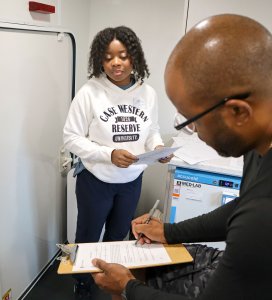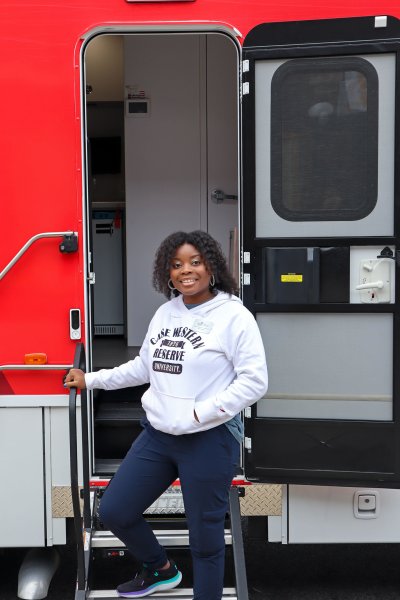Alumni Profile: Rebecca Manning Miller '17

Battling Cancer on the Front Lines
Barbershops are iconic in American culture. One can get a fresh cut, make friends, enjoy fun conversations, and catch up on the latest sports news. But what if barbershops could also help men receive critical and preventive health care?

Rebecca Manning Miller '17 and the Cleveland African American Prostate Cancer Project (CAAPP) are meeting men where they are—in barbershops— to deliver life-saving information. A Case Western Reserve University program, the CAAPP, is a randomized control study that seeks to leverage barbershops and the existing relationships between barbers and their clients to bring prostate cancer screening and education to Black communities in Greater Cleveland.
As the project director of CAAPP, Rebecca's role includes many responsibilities, including project management and evaluation, facilitating the work of multiple teams, participant recruitment and engagement, data collection and analysis, communications, and more. "My team members have described me as the glue of the team that keeps all the various elements of our study working in harmony," Rebecca says.
"The most fulfilling aspect of my job is helping to provide community members with prostate cancer screening, education, and resource connection while also building an extraordinary skill set in managing our study's various research, clinical, administrative, and community aspects. A typical day is never the same, which is what I love most about this work," she says.

Rebecca's work with CAAPP is bringing vital healthcare into underserved areas.
"Cleveland can seem big at times, but we are a close-knit city, and when collaboration is at the center of institutional partnerships, we can do some damage to health disparities," she says. "We have almost 100 people consented to CAAPP and screened over 50 individuals for prostate cancer. We are working with over 70 barbers across different shops to accomplish this work."
Rebecca notes that her career path has been unconventional, beginning as a chemical and biological safety specialist after graduating from Ohio Wesleyan. Once she started working at Case Western, she earned a master's of public health with a concentration in population health research and a master's of science in nutrition.
"When I saw the role for project director at CAAPP, a colleague of mine encouraged me to apply, and I'm so glad I did," she says. "It's the perfect culmination of my skills and provides an increased opportunity to make a direct impact in my home city of Cleveland."
Ericka Kurtz
